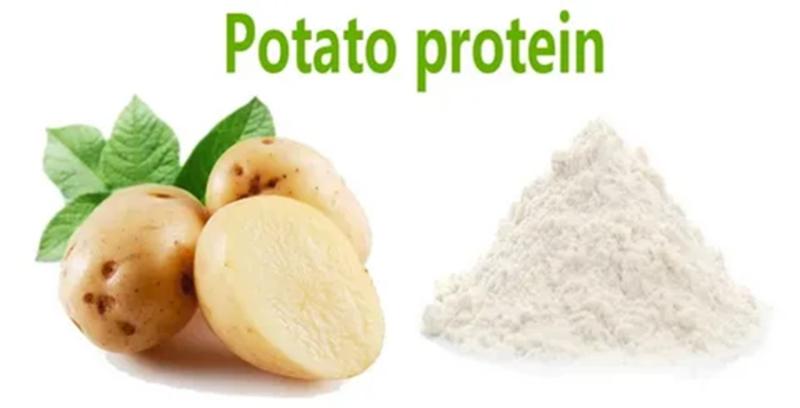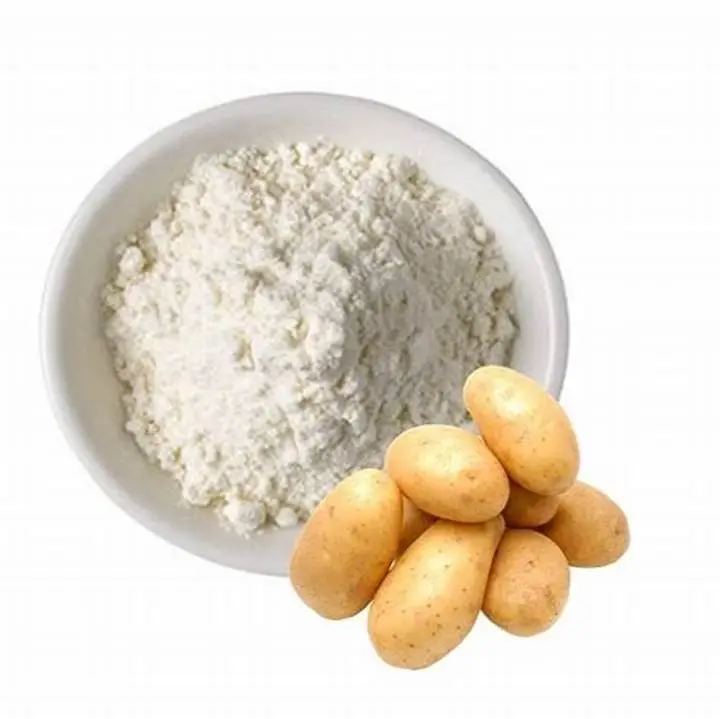Potato Protein Powder: Nutrition Facts and Health Benefits
Potato protein powder has emerged as a popular choice in the world of plant-based protein supplements. Known for its high protein content, easy digestibility, and nutritional profile, it offers numerous health benefits. Whether you’re an athlete looking to support muscle recovery or someone interested in maintaining a healthy diet, potato protein powder can be an excellent addition to your routine. In this article, we will explore the nutrition facts and health benefits of potato protein powder to help you understand how it can contribute to your well-being.
What is Potato Protein Powder?
Potato protein is a plant-based protein, produced together with the potato starch from starch potatoes.
Potato proteins are found in powder-form and have a high protein content (78%).
In the process of extracting starch from potatoes, a protein-rich juice is produced. The proteins are then concentrated, purified and dried.
Potato proteins contain essential amino-acids in much higher proportions than many cereals-based proteins or proteins from animal origins.

Where and Why is it used?
The amino-acids that potato proteins contain perform essential functions in the body, such as supporting the body’s metabolism and lowering blood pressure. Potato proteins have many functional properties, they dissolve in water, absorb fat and have foaming abilities to add air bubbles in baked goods.
Potato protein offers superior emulsifying, foaming and gelling properties. They have shown to be able to substitute high-value animal proteins like caseinate, whey protein isolate, gelatine, egg albumen (egg white) and egg yolk, in various confectionery products, meat and meat analogues, non-dairy cheese, toppings and ice creams, and egg-free dressings. Also, excellent gluten-free bakery goods can be achieved. Potato protein is also a replacement for aquafaba, or chickpea/garbanzo water for vegan meringues or macarons.

Nutrition Facts of Potato Protein Powder
Potato protein powder is a rich source of protein, and it’s particularly popular among vegetarians, vegans, and individuals with dietary restrictions. Below are the typical nutrition facts for a 30-gram serving of potato protein powder. Keep in mind that exact values can vary depending on the brand and formulation.
-
Calories: 120-130 kcal
-
Protein: 20-25 grams
-
Fat: 0.5-2 grams
-
Carbohydrates: 2-4 grams
-
Fiber: 1-2 grams
-
Sugars: 0 grams
-
Sodium: 100-200 milligrams
-
Vitamins and Minerals: Trace amounts of potassium, magnesium, and calcium
The protein content is the highlight of potato protein powder, making it an excellent source of high-quality protein for those seeking to meet their daily protein needs. Additionally, the powder is low in fats and carbohydrates, making it an ideal supplement for individuals on low-carb or weight loss diets.

Health Benefits of Potato Protein Powder
-
High-Quality Protein Source
Potato protein powder contains all nine essential amino acids, making it a complete protein. This means it provides the necessary building blocks for muscle repair, immune function, and other bodily processes. It is particularly beneficial for individuals who may not consume animal-based protein sources, such as vegans and vegetarians, as it provides the full spectrum of amino acids needed for optimal health.
Studies have shown that plant-based proteins like potato protein are just as effective as animal-based proteins in promoting muscle protein synthesis and supporting muscle recovery after exercise (Børsheim et al., 2009). Whether you’re an athlete or simply looking to increase your daily protein intake, potato protein powder is a reliable option.
-
Supports Muscle Growth and Repair
Potato protein powder can help support muscle growth and repair due to its rich amino acid profile. After intense physical activity, muscles undergo microtears and require protein to rebuild and grow stronger. Consuming a protein source like potato protein powder can promote muscle recovery and reduce muscle soreness, allowing for better performance in future workouts.
The high leucine content in potato protein powder, one of the essential amino acids, plays a crucial role in muscle protein synthesis. Leucine triggers the activation of mTOR (mechanistic target of rapamycin), a key pathway involved in muscle growth (Breen & Phillips, 2011).
-
Weight Management and Satiety
If you’re trying to lose weight, increasing your protein intake can help reduce hunger and promote feelings of fullness. Potato protein powder is an excellent tool for those looking to manage their weight, as protein helps to control appetite by increasing the production of satiety hormones like peptide YY and GLP-1 (Slavin, 2012).
The high protein content in potato protein powder not only reduces hunger but also helps maintain lean muscle mass during weight loss. By preserving muscle, your metabolism stays active, which is essential for effective and sustainable weight management.
-
Aids in Digestion
Potato protein powder is highly digestible compared to other plant-based protein powders like pea or rice protein. This is due to its low levels of anti-nutrients, which can inhibit protein absorption in the digestive system. Additionally, potato protein powder is free from gluten, lactose, and other common allergens, making it easier on the stomach for individuals with sensitivities (Vannice & Rasmussen, 2014).
The fiber content in potato protein powder can also support digestive health by promoting regular bowel movements and supporting a healthy gut microbiome. Fiber helps regulate digestion and prevent issues like constipation.
-
Boosts Immune Function
Proteins are essential for maintaining a healthy immune system. The amino acids found in potato protein powder support the production of antibodies and enzymes that are crucial for fighting off infections and supporting overall immune health. Furthermore, the presence of vitamins and minerals like potassium and magnesium also plays a role in supporting the immune system and promoting general well-being.
-
Heart Health
While potato protein powder is low in fat, it is rich in certain amino acids that have been linked to cardiovascular health. For example, arginine, one of the amino acids found in potato protein, has been shown to improve blood flow by enhancing nitric oxide production. Nitric oxide helps relax and dilate blood vessels, which can improve circulation and reduce the risk of high blood pressure and heart disease (Mays, 2017).
Furthermore, potato protein powder can help lower cholesterol levels by improving lipid metabolism, which may contribute to overall heart health.
-
Vegan and Allergy-Friendly
One of the key benefits of potato protein powder is that it is a vegan protein source. It is also free from common allergens like dairy, soy, and gluten, making it an excellent choice for people with food sensitivities. As more people turn to plant-based diets, potato protein powder provides an easy way to increase protein intake without worrying about allergens or animal-based products.

How to Use Potato Protein Powder
Potato protein powder is incredibly versatile and can be used in a variety of ways:
-
Smoothies: Blend potato protein powder with water, almond milk, or coconut water for a protein-packed smoothie.
-
Baking: Add potato protein powder to your favorite recipes for muffins, pancakes, or protein bars.
-
Protein Shakes: Mix with your choice of liquid and consume post-workout to aid muscle recovery.
-
Oatmeal or Yogurt: Stir into your morning oats or yogurt for a filling, high-protein breakfast.

Conclusion
Potato protein powder is a highly nutritious, plant-based protein source that offers a wide range of health benefits. It provides all the essential amino acids, supports muscle growth and repair, aids in weight management, and promotes healthy digestion. It is also a vegan-friendly, allergy-free protein powder, making it accessible to those with dietary restrictions.
If you’re looking for a high-quality, easily digestible protein supplement, potato protein powder is a great option that can fit seamlessly into various aspects of your diet. Whether you’re aiming to build muscle, manage your weight, or improve your overall health, potato protein powder is a versatile and valuable addition to your nutritional toolkit.
References:
-
Børsheim, E., et al. (2009). Dietary protein and muscle mass: A meta-analysis. American Journal of Clinical Nutrition, 89(3), 797-803.
-
Breen, L., & Phillips, S. M. (2011). Interactions between exercise and nutrition to prevent muscle wasting and promote muscle hypertrophy. Journal of the American College of Nutrition, 30(6), 1-7.
-
Mays, R. (2017). The effects of arginine supplementation on heart health and blood pressure. Journal of Clinical Hypertension, 19(4), 421-428.
-
Slavin, J. L. (2012). Dietary fiber and body weight. Nutrition, 28(5), 311-318.
-
Vannice, G., & Rasmussen, H. (2014). Potato protein as a sustainable plant-based protein source. Food Science and Nutrition, 2(4), 344-352.

